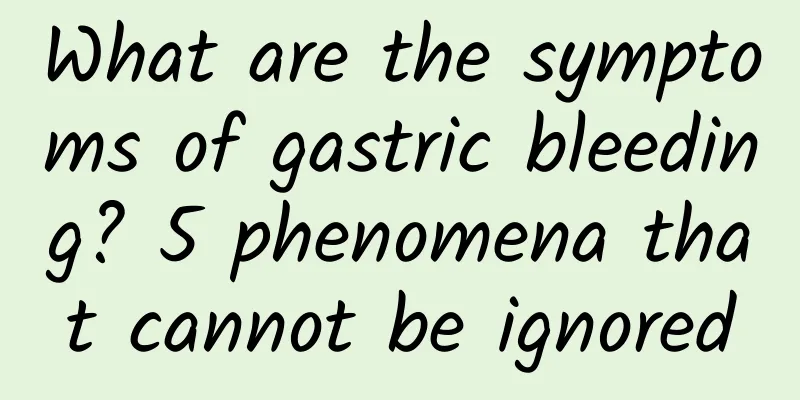What are the symptoms of gastric bleeding? 5 phenomena that cannot be ignored

|
Gastric bleeding is not common. It may be caused by drug stimulation, vomiting, or severe alcohol abuse, which can cause gastric bleeding. If you have stomach cancer, you will also have symptoms of gastric bleeding, and the patient's stool will be obviously black. 1. Vomiting blood and/or black stools. It is a characteristic manifestation of upper gastrointestinal bleeding. Patients with bleeding above the pylorus often experience vomiting blood and black stools, while patients with bleeding below the pylorus may only experience black stools. However, lesions above the pylorus with a small amount of bleeding and a slow bleeding rate may only cause black stools, while lesions below the pylorus with a large amount of bleeding and a fast bleeding rate may cause vomiting of blood due to the reflux of blood into the stomach. 2. Hemorrhagic peripheral circulatory failure. Bleeding within 400ml may be asymptomatic, while moderate bleeding may cause anemia or progressive anemia, dizziness, weakness, and sudden standing up may cause syncope, thirst, cold limbs, and low blood pressure. Massive bleeding reaching 30% to 50% of the total blood volume can cause shock, which is manifested as irritability or confusion, pale complexion, cold and clammy limbs, cyanosis of the lips, difficulty breathing, blood pressure dropping to unmeasurable levels, decreased pulse pressure difference, and a rapid and weak pulse. If not handled properly, it can lead to death. 3. Azotemia. 4. Anemia and changes in blood count. After acute massive hemorrhage, there will be hemorrhagic anemia. In the early stage of bleeding, there may be no obvious changes in hemoglobin concentration, red blood cell count and hematocrit. Generally, it takes more than 3 to 4 hours for anemia to appear. After 2 to 5 hours of massive upper gastrointestinal bleeding, the white blood cell count may increase significantly and return to normal 2 to 3 days after the bleeding stops. However, in patients with cirrhosis and hypersplenism, the white blood cell count may not increase. 5. Fever. In cases of moderate or massive bleeding, fever occurs within 24 hours, mostly below 38.5 degrees, and lasts for several days to a week. |
<<: Exercise is the best treatment for gastroptosis
>>: What are the symptoms of cholecystitis? Early warning of cholecystitis
Recommend
Yoga exercises to relieve cervical vertebrae, three exercises can easily solve the problem
Did you know? Cervical spondylosis can also be re...
All Chinese medicine effects
Traditional Chinese medicine has a long history a...
What to do if myocardial ischemia
In life, there are some people who scare themselv...
Renhe Qi-Yin Yangxue Oral Liquid
From the perspective of traditional Chinese medic...
What diseases can Panax notoginseng powder cure?
As people's living standards improve, their a...
Farting, acne, hemorrhoids, increased hair, and other embarrassing things during pregnancy. What should you do?
Pregnancy changes not only your life but your bod...
Clinical manifestations of high altitude pulmonary edema
People in the plains like to travel to the platea...
Shoulder bones make a sound when you move them
People are very concerned about their physical co...
What should I pay attention to in a routine blood test?
Everyone hopes that their body can be healthy, bu...
Is cupping a good way to lose weight?
Cupping for weight loss is a very popular way to ...
Is bulging of lumbar vertebra 3 serious?
A normal person's lumbar vertebra usually has...
Can steaming in a steam room help you lose weight?
Nowadays, many health clubs can be seen everywher...
Does coughing with intravenous drip heal quickly?
Coughing is just a symptom, it is not a separate ...
What causes female femoral hernia?
Female femoral hernia is also relatively common, ...
Motor neurone disease
Do you know about motor neuron disease? I believe...









